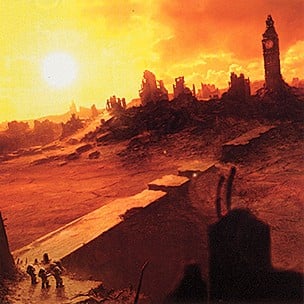Progarchives.com has always (since 2002) relied on banners ads to cover web hosting fees and all.
Please consider supporting us by giving monthly PayPal donations and help keep PA fast-loading and ad-free forever.
/PAlogo_v2.gif) |
|
Post Reply 
|
| Author | |
Toaster Mantis 
Forum Senior Member 

Joined: April 12 2008 Location: Denmark Status: Offline Points: 5898 |
 Topic: Criticism's role in music Topic: Criticism's role in musicPosted: August 26 2014 at 06:21 |
|
One thing that's perplexed me for a long time is how professional reviews of popular music still on average is on a much lower academic level
than those of literature and film, both in terms of technical know-how
or general theory involved as well as how often it goes beyond "buying
guide territory".... and I'm not quite sure why. This even extends to if
you compare major tastemaker music reviewers (Robert Christgau, Lester
Bangs etc.) to their equivalents within film criticism (Roger Ebert,
Pauline Kael etc).
What I do find interesting here is that with even the better music publications (Gaffa, Metalized, Mojo, Soundvenue) the interviews are usually much more in-depth and detailed than the reviews, a difference in focus I don't think I've ever pondered that much. It could be that popular music, at least the niches that attract intense scrutiny, is in a sense more abstract and personal than literature and film, but again it's not something I'm certain about. I guess this could be where the fanzines and the online press come in, at least where the niche genres are concerned, though the internet-based part I find to have become regrettably SEO-ified in recent years. For this reason I've been grateful to discover Lurker's Path, a website that in my opinion does a much more satisfying job at representing the metal scene's more intellectual corners than say deathmetal.org or Invisible Oranges. A while ago they printed this editorial, which covers the subject in interesting detail including the internet's potential impact on music journalism - the writer is also the man behind Black Ivory Tower, a metal fanzine that among the few focuses on reviews above interviews. |
|
|
"The past is not some static being, it is not a previous present, nor a present that has passed away; the past has its own dynamic being which is constantly renewed and renewing." - Claire Colebrook
|
|
 |
|
richardh 
Prog Reviewer 

Joined: February 18 2004 Location: United Kingdom Status: Offline Points: 26151 |
 Posted: August 26 2014 at 15:45 Posted: August 26 2014 at 15:45 |
|
There always seems a hidden agenda with music criticism. The gulf between the so called prog supergroups and the punk new wave scene also fostered a political agenda with music critics I believe.
Films in general don't cause as much rumpus because its okay to enjoy a 'popcorn movie' as well as something that is intended to make you think and reflect like an 'art house movie'. This makes discussing films a whole lot more relaxed than music where you have to take a side. Music critics are much more self conscious and have almost immature need to appear 'cool'. I guess in music there is no real parallel to the idea of a popcorn movie?!
|
|
 |
|
Dean 
Special Collaborator 

Retired Admin and Amateur Layabout Joined: May 13 2007 Location: Europe Status: Offline Points: 37575 |
 Posted: August 26 2014 at 17:12 Posted: August 26 2014 at 17:12 |
|
Rock & Pop Music reviews differ from other forms of Art Criticism (cinema, theatre, literature and classical music recording and performance) in one important aspect - it never grew-up.
Initially pop music reviews were written by 30-40 year old professional journalists writing down to their teenage audience while giving a relatively objective description of the music, for example in 1963 the then 35 year old Keith Fordyce in The New Musical Express reviewed the Please Please Me single like an elderly uncle describing it to his 13 yo niece: ('...this vocal and instrumental quartet has turned out a really enjoyable platter, full of beat, vigour and vitality ... "Ask Me Why" is really good flopside value'). Within a few years this was usurped by a younger generation of music journalist who had notionally embraced the Gonzo approach of New Journalism, (without perhaps fully understanding it). While still half a generation older than the teens they were writing for, the style they adopted was less literary and more from the perspective of an informed but passionate elder brother; their language was more in-tune with the reader and much of the wordy/descriptive/factual information was dispensed with. In this format of review objectivity took a back seat as the review became less about the music and more about the reviewer's reaction to it. This informal, colloquial style of writing when stripped of the literary techniques of story-telling and invention that typify New Journalism becomes a one-sided dialogue between the reviewer and the silent reader that whenever it tries to be informative and objective ends up sounding condescending. This set the format for Pop & Rock reviews that have endured to this day. Any attempt to make Rock reviews more serious and mature (which would go some-ways to giving it academic and literary gravitas) in the 1970s was soon shut-down by the Punk rock "revolution" that pretty much pogo'd music journalism back to the Stone Age. Basically, Rock reviews are stuck in their adolescence |
|
|
What?
|
|
 |
|
Toaster Mantis 
Forum Senior Member 

Joined: April 12 2008 Location: Denmark Status: Offline Points: 5898 |
 Posted: August 30 2014 at 04:49 Posted: August 30 2014 at 04:49 |
|
I'm not sure, weren't a lot of the people involved with the original punk subculture more concerned with how popular music fit into the cultural context at large hence how that scene aspired to be a "cultural movement" and not just a music genre? In my experience punks seem to be some of the people most pre-occupied with what music means, artistically and ideologically.
As for Richard H.'s comment, I'm not so sure about that. I'm under the impression that professional film critics have generally valued "art cinema" higher than genre work until very recently. Genre film being more respected than it used to just 20 years ago I think has something to do with the internet democratizing film criticism to a very large extent, if often in somewhat lopsided ways. |
|
|
"The past is not some static being, it is not a previous present, nor a present that has passed away; the past has its own dynamic being which is constantly renewed and renewing." - Claire Colebrook
|
|
 |
|
Post Reply 
|
|
| Forum Jump | Forum Permissions  You cannot post new topics in this forum You cannot reply to topics in this forum You cannot delete your posts in this forum You cannot edit your posts in this forum You cannot create polls in this forum You cannot vote in polls in this forum |